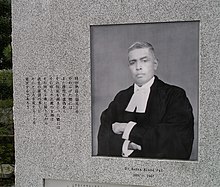Radhabinod Pal

Radhabinod B. Pal (born January 27, 1886 , † January 10, 1967 ) was an Indian legal scholar and judge .
Life
Pal, who came from a Bengali - East Pakistani family, initially studied at the Presidency College of the University of Calcutta after attending school . He then completed postgraduate studies in mathematics and constitutional law at the Law School of the University of Calcutta.
In 1923 he was appointed professor of law at the University of Calcutta, where he taught until 1936. In 1941 he was first a judge at the Calcutta High Court , before he was Vice President of the University of Calcutta in 1944.
In 1946, Radhabinod Pal was appointed as a representative of India to the judge at the International Military Tribunal for the Far East, who was responsible for conducting the Tokyo trials against those responsible for the Imperial Japanese Army in World War II and especially in the Pacific War .
His vote attracted particular attention: while when it was announced on November 12, 1948, the majority vote was accepted by the judges from the USA , Great Britain , the Soviet Union , the Republic of China , Canada and New Zealand and the judges from the Netherlands , France , India , the Philippines and Australia published individual minority votes, especially his acquittal vote for all defendants became known. In his 1,235-page legal view, Pal criticized that only Japanese were accused and that they were only judged by their opponents, and accused the trials of winning justice that the basic principle of the presumption of innocence was not applied and that hearsay was readily accepted as evidence, and that at the time of the offenses the main charges of waging a war of aggression or “crimes against peace” were not punishable ( nulla poena sine lege ). Publication of his vote was banned by the occupying powers in Japan .
Between 1952 and 1966 he was also a member of the International Law Commission of the United Nations .
In 2005 he was given a monument ( パ ー ル 博士 顕 彰 碑 , Pāru-hakase kenshōbi , German "Dr. Pal-Appreciation memorial ") in the Yasukuni Shrine in Tokyo because of his acquittal .
literature
- Takeshi Nakajima: The Tokyo Tribunal, Justice Pal and the Revisionist Distortion of History . In: The Asia-Pacific Journal . Vol. 9, No. 44/3 , 2011 ( online ).
Web links
- Radhabinod Pal in the nndb (English)
- Pals legal opinion to the International Military Tribunal for the Far East (English)
- Norimitsu Onishi: Decades After War Trials, Japan Still Honors a Dissenting Judge , New York Times (English)
Individual evidence
- ↑ Timothy Brook: Radhabinod Pal on the Rape of Nanking: The Tokyo Judgment and the Guilt of History . In: Bob Tadashi Wakabayashi (Ed.): The Nanking Atrocity 1937-38. Complicating the picture . Berghahn Books, 2009, ISBN 978-1-84545-500-2 , pp. 159–162 ( limited preview in Google Book search).
- ↑ 24. Monument of Dr. Pal. Retrieved May 21, 2009 .
| personal data | |
|---|---|
| SURNAME | Pal, Radhabinod |
| ALTERNATIVE NAMES | Pal, Radhabinod B. |
| BRIEF DESCRIPTION | Indian legal scholar and judge |
| DATE OF BIRTH | January 27, 1886 |
| DATE OF DEATH | January 10, 1967 |